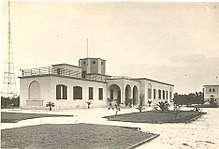Radio Bari
The Radio Bari station, broadcasting from Bari in southern Italy, with a power of 20 kW, was commissioned by the Italian national broadcasting company, EIAR, in 1932.

Radio Bari during the Fascist Regime
By decision of the Fascist regime, in 1934 Radio Bari started to broadcast propaganda and counter-propaganda programmes, accompanied by music and political commentaries, for listeners in Arabic-speaking countries. These broadcasts, aired at regular intervals from 10.30 a.m. until 3 a.m., were received throughout the Mediterranean basin, reaching countries including Egypt, Palestine, Iraq, Syria, Lebanon, Algeria, Tunisia and Morocco, where British or French influence was at that time predominant. A few months later, the station also began to broadcast in the Greek language. The months that followed saw a true radio war, which lasted throughout World War II, including jamming of radio signals, between the Axis and Allied radio stations.
Radio Bari during the Resistance
On 8 September 1943, the Bari transmitter, one of the few still operating in southern Italy, was peacefully occupied by a group of local intellectuals politically close to the philosopher Benedetto Croce together with groups of anti-fascists, republicans, democrats and activists of the Action Party. With the help of some radio technicians, they were able to transmit on 11 September the first message of the King of Italy, Victor Emanuel III, after his departure from Rome. Radio Bari was thus able to broadcast the first broadcast of free Italy. Starting from 23 September 1943, the premises of Radio Bari were occupied by the Americans who immediately made it the organ of their headquarters in Algiers. The core programme was Italia combatte (Italy fights on) in which, while complying with the directives of the Allied Command, the speakers targeted the public opinion of southern Italy with interesting features full of news and testimonies from the front, as well as on guerrilla actions, together with information for partisans and anti-fascist propaganda. These political programmes were supported by "a lot of music for which an entire record store was seized". [1] In his 2011 history of the British Special Operations Executive (SOE) in Italy in the years 1943-45, David Stafford says:
Contact with resistance groups was also maintained through Radio Bari. This was a station under allied control from which, every night at 2030 GMT, a special resistance programme, produced jointly by No. 1 Special Force and the Political Warfare Board Executive, was broadcast throughout Italy. It was through this link that general directives were sent to resistance groups, and that reception committees were alerted to supply drops. It would also be the means by which the resistance in general would be ordered to act when the signal was given." [2]
References
External links
Bibliography
- Franco Monteleone, "Storia della radio e della televisione in Italia. Un secolo di costume, società e politica. Nuova edizione aggiornata", Venice, Marsilio, 2003. ISBN 88-317-7230-9
- David Stafford, "Mission Accomplished: SOE and Italy 1943–45", Vintage Digital, 2011. ISBN 9781-409027829
On Fascist policy towards the Arab countries:
- Enrico Galoppini, "Il fascismo e l'Islam", Edizioni all'insegna del Veltro, 2001.
- Stefano Fabei, Giovanna Canzano, "Fascismo, Nazionalsocialismo, gli Arabi e l’Islam", Arianna Editrice, 2009.